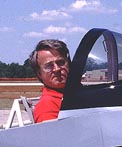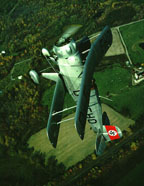 Grassroots
Grassroots 
Weekends are Head Fuel
Grassroots
Budd Davisson, December, 1993
Weekends are Head Fuel
It's Monday. 'Nuff said? Like every living soul who isn't one of the idle rich, I'm looking down the long tunnel that has a great big Monday hanging at one end and a little bitty Friday at the other.
Will I make it to Friday?
Of course I will and I'll get there long before I'm ready. So will most of us who spend our week ends savoring the third dimension. We have a leg up on the entire rest of the ground bound world and by noon on Monday they all know it, as we go blasting past them. Pity the poor folks who open their eyes on Monday and are trying to start their mental motor with batteries charged only by three football games, a Saturday night pizza and a morning spent in an abortive attempt to clean the garage. They sat and watched as their weekend passed them by.
Yeah, I know. It's different strokes for different folks, but, when I straighten out my left arm early Saturday morning and, with only a subtle twitch of my right wrist, leave the world and all its BS behind, how can I help but look around at all the roof tops and not feel for those who sleep beneath them?
Life is not a spectator sport. It was never meant to be and, although the talents of a Joe Montana or Charles Barkley can be truly awesome (at least, when they get it together), it somehow seems criminal to be squandering time by living life through someone else. It's like going to a Mexican cook-off and having someone else do the tasting.
Weekends are there for a reason. They are meant to be battery chargers for the rest of the week, which means, when they are all strung together, they are actually what get us through life. What we do during the weekend is largely responsible for what we know and what we see when we look back on our life and remember. In some measure, they make us what we are.
Do we want to remember what we saw as spectators or what we accomplished and experienced as participants?
As it happens, aviation is one of those activities which has a wonderful grey area surrounding the definition of participation. Yes, there is no doubt that hammering the stick into the corner for a double snaproll is participation, as is drifting along just above the tree tops on the neon waves of a setting sun. But aviation has a thousand levels of participation, all of which can grab ahold of our respective battery terminals and spit us out of bed on Monday all charged up and ready to rock and roll.
For pilots and owners, the weekend should be viewed as that period of time during which at least a couple hours will be devoted to stepping out of the ordinary and into the extraordinary. This may be nothing more than a quick trip around the patch to shoot a couple landings. It may even be time spent on the ground running a rag covered hand over the surfaces of a machine that actually lives and, at that moment, needs a little TLC.
Airplanes have some sort of illogical magic to them and just the knowledge that they are capable of flight seems to mutate into some sort of life-energy that flows out of them and into those who caress them with a loving touch.
A lot of an airplane's effect on the human mind is difficult to define and totally impossible to explain to those who don't feel it. They can't understand that simply sitting in the hangar close to an airplane is almost as exhilirating as flight itself. They can't possibly know the effect of inhaling the aroma of flight or watching the low light play with the curves that give the airplane it's marvelous abilities. To them it's a machine. To us it's a tangible representation of what is possible, when the engineer's mind is right and the pilot's hand gentle.
That's the grey area of airplane participation. You don't actually have to fly to be in the game. You don't have carry a piece of paper in your pocket that says some higher regulatory authority has deemed you a pilot. Neither the paper nor the acquired skills are what define a pilot. It is the feeling for the machine and its possibilities that make up that definition. There are lots of folks who have the requisite piece of paper and will never, ever actually be pilots because they have never made the connection.
And then there are thousands of those who will always be pilots, although they may never have spent a single minute at the controls. Circumstances have kept them out of the cockpit but the emotion is there and they come to the airport to get their batteries charged because, once the visual connection is made, the energy starts flowing.
Participation doesn't require actually strapping it on because, to the observant, things that fly always teach lessons and make everyone around them richer by giving them not only memories, but concrete knowledge and skills. If the individual has the right mind set, just parking by the runway and watching takeoffs and landings pulls him out of his spectator role into that of a participant. If his mind chronicles each landing, carefully noting each subtle movement, he unwittingly shares part of that experience with the pilot. Although his hands were not on the controls, his mind was, and that is the essence of learning. So, he comes away with something in his mind that wasn't there before and he is richer because of it.
Participation can be nothing more than sitting in the coffee shop or on the ever-present bench in front of the hangar doing a little hangar flying. Airport talk always imparts a new tid bit of information, a new technique or a fact that, when combined with all those that went before build a base of knowledge and experience that will last a lifetime.
The best way to keep a battery charged is to excercise it and continually stuff energy back into it. Is a life any different?